Related Research Articles
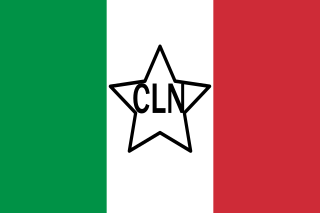
The Italian resistance movement was the Italian resistance groups who fought the occupying forces of Nazi Germany and the fascist collaborationists of the Italian Social Republic during the Second World War in Italy from 1943 to 1945. As a diverse anti-fascist movement and organisation, the Resistenza opposed Nazi Germany, as well as Nazi Germany's Italian puppet state regime, the Italian Social Republic, which the Germans created following the Nazi German invasion and military occupation of Italy by the Wehrmacht and the Waffen-SS from 8 September 1943 until 25 April 1945.
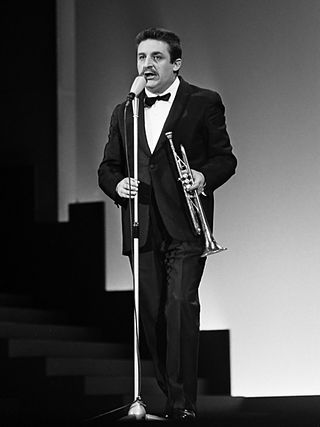
Raffaele Celeste "Nini" Rosso was an Italian jazz trumpeter and composer.
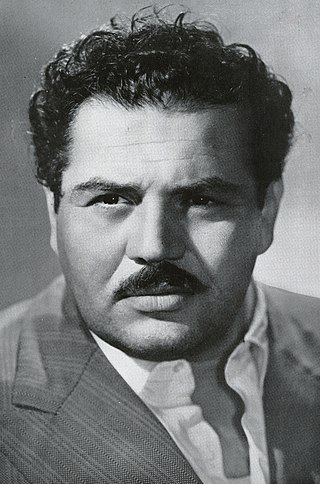
Folco Lulli was an Italian partisan and film actor. He appeared in more than 100 films between 1946 and 1970. He was the elder brother of actor Piero Lulli.

Enrico Martini Mondovì, 29 January 1911 – Turkey, 19 September 1976) was an Italian soldier and partisan, an Alpini Major, founder of the 1 Group Alpine Divisions in the Italian Resistance, and a recipient of the Gold Medal of Military Valor.

Sergio Flamigni is an Italian politician and writer. A member of the Italian Communist Party (PCI), he took part in the Italian Parliament's investigative commissions on the murder of Aldo Moro, the Propaganda Due scandal, and on the Italian Mafia.
Tigrino Sabatini, was a communist and a leader of the Italian Resistance, executed for his activities as a zone-commander of the Movimento Comunista d'Italia, also known as Bandiera Rossa.
Scintilla was a communist circle created in Rome in 1940, as one of a number of attempts to refound the Communist Party of Italy (PCd'I) banned since 1926. Most of its leaders would later contribute to creating the dissident-communist Movimento Comunista d'Italia, largest formation of the Italian Resistance in Rome.

Adriano Ossicini was an Italian partisan, politician, psychiatrist, academic, and Minister for Family and Social Solidarity in the Dini Cabinet.
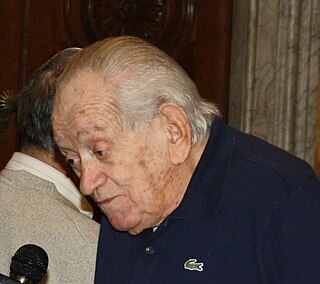
Raimondo Ricci was an Italian politician and partisan, President of National Association of Italian Partisans from 2009 to 2011.
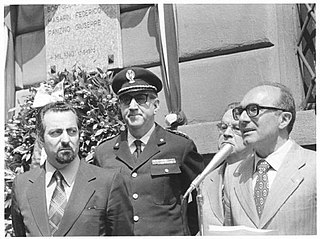
Agostino Casali known as Tino was an Italian politician and partisan, President of National Association of Italian Partisans from 2006 to 2009.
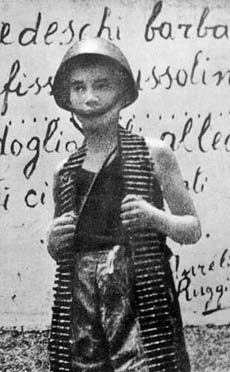
Filippo Illuminato was an Italian partisan who died attacking Nazi German troops during the Four days of Naples in World War II. He was posthumously awarded the Gold Medal of Military Valour, Italy's highest award for gallantry.
The Italian partisan brigades were armed formations involved in the Italian resistance during the World War II.

The Brigate Garibaldi or Garibaldi Brigades were partisan units aligned with the Italian Communist Party active in the armed resistance against both German and Italian fascist forces during World War II.
Women's Defence Groups, or Defence Groups for Women and for the Assistance of Freedom Fighters, was a multi-party organization of women during the Italian Resistance. Formed in Milan in November 1943, the initiative was spearheaded by the Italian Communist Party, as part their vision for a united front against fascism.

Walkiria Terradura was an Italian anti-fascist partisan during the Second World War. She was awarded the Silver Medal of Military Valour.

Pietro Amendola was a communist Italian politician and journalist, who served in the Chamber of Deputies from 1948 until 1968. A war hero, and anti-fascist partisan, his father was Giovanni Amendola, a noted anti-fascist in the 1920s, and his brother, Giorgio, was also a communist politician.

Giuseppe Cordero Lanza di Montezemolo was an Italian soldier and Italian Resistance member.
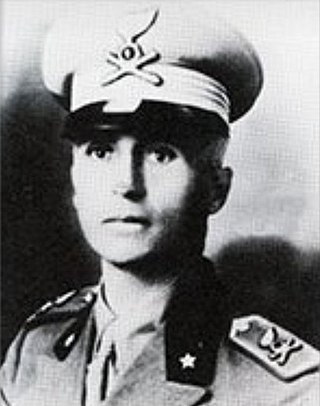
Salvatore Pelligra was an Italian general during World War II. He was brother of General Raffaele Pelligra, who commanded the Guardia di Finanza from 1947 to 1953.
The anarchist brigades of the Italian Resistance were active during the Second World War, especially in central and northern Italy.
Paolo Spriano was an Italian historian of the Italian labor and communist movement.
References
- ↑ Broder, David (March 2015). "I partigiani che volevano fare la rivoluzione". Micromega.
- ↑ Corvisieri, Silverio (1968). Bandiera Rossa nella Resistenza romana. Rome: Samona e Savelli.
- ↑ "Perché collaborare". Bandiera Rossa. 5 October 1943.
- ↑ "Donne e Uomini della Resistenza: Tigrino Sabatini". www.anpi.it. Retrieved 2015-10-03.
- ↑ "Donne e Uomini della Resistenza: Raffaele De Luca". www.anpi.it. Retrieved 2015-10-03.